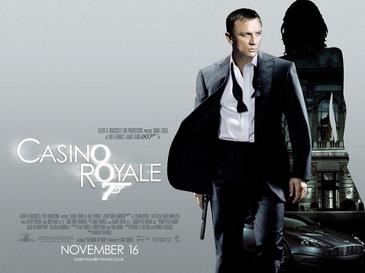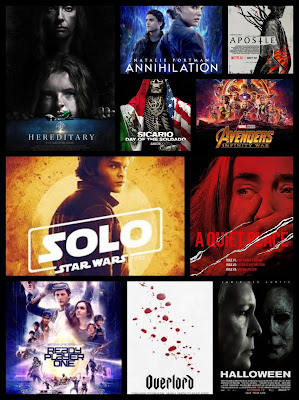Casino Royale
If I suffered a catastrophic memory loss and all memory of the film Casino Royale was removed from my mind, I think I'd be a very different person. At the time of its release, I was 15 years old, already well versed in all things Bond (having done a public speaking contest at my school on the topic, where I enjoyed saying "Pussy Galore" to a hall full of students and teachers), and was already ready to defend the then controversial picking of Daniel Craig. I'd read all the Fleming books, I had the DVD boxset, I'd played the games, I thought Bond was "it".
Casino Royale was however something else. I remember seeing it for the first time on a Wednesday night, at a charity screen at the Vue cinema in Southport, England. And then again on the weekend. And then again the next week. Then twice again in Australia, visiting family later in the year. The amount of times I've seen it since then? Countless. Is this the best Bond film in the series? Probably. Is it one of my favourite films ever made. Undoubtedly.
But the process in getting the masterpiece to the screen was no easy task for the filmmakers. Having read the backlash of the fantastical sci-fi elements of Die Another Day, they wisely read the room, and took particular note of what Christopher Nolan had accomplished with Batman Begins: resurrecting a once dead franchise, ditching the camp, upping the darkness, and reaping the rewards. Like that film, they looked to the protagonist's origins for inspiration, and picked Casino Royale, the first Bond book. Quentin Tarantino showed interest in helming this reboot, but only if Brosnan was in the title role, and he wanted it set in the 60s.
Nevertheless, the focus on the psychological rather than pyrotechnical was the easy gear change for the filmmakers, recasting the role proved the most controversial. Names were tossed about, including Karl Urban, and a then 22 years old Henry Cavill, but the man for the job was Daniel Craig. And the media went wild, with The Daily Mirror running the headline "The Name's Bland, James Bland." Couple this with the precursor to the sort of basement dwelling, entitled fanboy rage (which we now seem to get on a daily basis), with websites setup called "Bond Not Blonde," its a minor miracle that Craig didn't simply chuck the towel in. Prior to Casino Royale, however, you can understand why Craig wasn't a wild card to play 007. His role in Layer Cake may as well be an audition tape, as he gets to deliberately pose like Bond, with Luger pistol raised. Although Craig is clearly lucky to have a stuntman step in for various action scenes (most notably during the extended parkour chase at the start of the film), you can't say that he doesn't look like he could handle himself in a fight. Just have a gander at his homage to Honey Ryder in Dr No, as he emerges like a great white shark in swimming trunks from the waters. For the first time in the series, you actually believe this Bond is a living weapon.
It should go without saying, but Craig is fantastic in the role - something that many would not have been comfortable betting on with all the nonsensical knee-jerk reactions prior to the release of the film. Prior to Casino Royale, Dalton's films came the closest to showing a broken and bruised Bond, but here he really gets put through the wringer. Physically, Craig is like a bull in a sharp suit, breaking bones and snapping necks, but without the quick ease of death that was a feature of all Bond flicks. Here, death is rarely quick, rarely painless, and often leaves the survivor physically and emotionally scarred. Take the classic black and white pre-credit sequence. Watch as Bond engages in a brutal bathroom brawl with his first ever kill. Take in the exhaustion and fear in his eyes after the kill is done. This is again mimicked in a savage stairway assault, as Bond battles a machete wielding assailant, before strangling him to death. Does he let out a quick quip? Does his eyebrow raise? No, he yells as Vesper Lynd to get help, returns to his hotel room to dress his wounds, and looks intensely into the mirror with a glass of whiskey by his side.
And speaking of Vesper Lynd - perhaps this film would not be anywhere near as good if the writing and casting of this character was not so on point. Deep down, whilst a spy novel, Casino Royale also has to function as a love story between Bond and Lynd. Their relationship has to be believable enough that the eventual destruction of it is catastrophic to the point that you would buy that it would colour every other relation that Bond would go on to have. With Eva Green, the filmmakers struck gold. Bringing wit, humour, charm, and beauty to the role, you can completely see why her and Bond are drawn together so magnetically after their first scene onboard the train. They both trade barbs with each other during this meeting, each character with their own armour up and over the course of the film, you watch this armour fall away.
If I had any criticism towards the film, it is that part of me wishes that the scriptwriters stuck with the original ending that they had in mind (which mirrors the book): Vesper is still a double agent, having been blackmailed by a secret organisation (in the book SMERSH, in the film the yet unnamed Quantum) but rather than drowning in a chaotic final action scene, she instead realises that her blackmailers are tailing her and Bond, and commits suicide, leaving a note explaining her actions to a distraught Bond. This would've been a tricky feat to pull off in a blockbuster movies, not ending with a bang but a something more mournful. However, they do keep Bond's killer send off line intact "The job's done, the bitch is dead." Perhaps another failing of Craig's tenure is echoed in reality and in film: neither Bond nor the series has ever really recovered from the death of Vesper, with none of the female love interests subsequent to her being as well drawn. She is without a shadow of a doubt, the best Bond girl in the series.
But Vesper isn't the only female lead for this film, as prior to her introduction, the other key player in proceedings is M, again played by Judi Dench. Further expanding upon her role that exponentially grew over the course of Brosnan's tenure, Dench continued to solidify herself as the face of that role. She would go on to leave a further lasting impact in her last two Bond film's, but her sparring with this juvenile version of Bond in Casino Royale, also sharpens the psychological aspect of the film. She simply passes on the baton to Vesper at the midpoint.
Opposite Bond and Vesper is a villain that melds that aesthetics of old, with the motivations of the new: Mads Mikkelsen's shark eyed Le Chiffre. In the novel, Le Chiffre is described as a bloated and corpulent, whereas Mikkelsen is anything. He's a slickly dressed, shadow of a man, with a neat Bondian bleeding scarred eye. The modern angle comes from his plan. He acts as a financier to the world's terrorists, allowing them stash their ill-gotten gains with him, for access anywhere in the world. Unbeknown to them, he has been using these funds to play the stock market, and when one play goes horribly wrong for him - due to some interference by Mr Bond - he has to use desperate measures to recoup the money, or face bloody retribution from his employers. So unlike every other Bond villain, Le Chiffre is not necessarily in control of everything around him and his final scenes involve another rarity for a villain in the series: desperation and fear. Mikkelsen easily flicks between icy calm and rage in these scenes, before his final lines reveal just how insignificant he really is.
Speaking of that scene, lets talk about the chair without a bottom and the big old rope. The Bond films have never shied away from elaborate torture scenes, but as Le Chiffre says he doesn't really understand them, as "it's the simplest thing, to cause more pain than a man can endure." This scene is like a microcosm for the ethos of the entire film: strip back the superfluous elements, up the emotional and physical stakes, make sure every punch, every strike lands, and ensure sure your protagonist and antagonist have skin in the game. Making the male members (no pun intended) of the audience squirm is but an added bonus.
And somehow, the film gets to have its cake and eat it, mixing an action packed first half, with parkour and airfield demolition derby, with a more low-key second half, where the majority of the drama is confined to a poker table. Yes, the expository dialogue explaining poker to the audience is a bit on the nose but I'd rather have something blunt and understandable than be scratching my head trying to work out the stakes. As mentioned earlier, it is just a shame that the film loses its bottle a little in the third act, but a Bond film has to Bond and so we get a well shot and choreographed battle in a collapsing house in Venice. And to be honest, despite the crash and bang, Vesper's death still hits like a meteorite again completely sold by Eva Green and Daniel Craig, with her underwater death cry and his subsequent look of anguish after failing to resuscitate her selling the moment.
Casino Royale acted as a renewed promise for the Bond series, one that ticket sales showed that there was an audience for. Out with the meglomaniacal plans for world domination, in with smaller-scale, but no less action-packed espionage dramas, with Bondian trimmings. It is therefore a shame that, Quantum of Solace aside, the remainder of Craig's tenure has tended to hew closer to the Bond films of old, just with more style and a greater emphasis on the psychology of the characters. Whilst Quantum of Solace certainly has issues, the distance in tone between it and Casino Royale is closer than Casino Royale and Skyfall or Spectre. No Time to Die looks to be again kin with Skyfall and Spectre, so it is unlikely that we will get this perfect melding of a relatively small-scale action movie, with a strong focus on character. Truly the best the series has to offer. You can bet on it.








Comments
Post a Comment